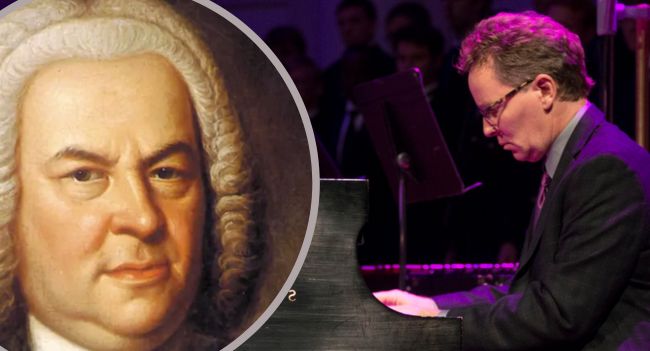Bach, Mozart and Beethoven all thrilled audiences with their spontaneous improvisations. But today’s classical pianists have lost the art, according to a music scholar, who argues that performances suffer because they are so dependent on the printed score.
John Mortensen claims that such improvisation skills were all but lost by the 20th century and that few classically trained musicians can now do so in any style.
The U.S. Department of State and the J. William Fulbright Foreign Scholarship Board are pleased to announce that Dr. John Mortensen of Cedarville University has received a Fulbright U.S. Scholar Program award to Lithuania in the discipline of music.
Mortensen is internationally recognized as a leader in the revival of historic keyboard improvisation. His students include faculty from leading music conservatories around the world. He will concertize, lecture, and research at the Lithuanian Academy of Music and Theatre and throughout the county as an artistic ambassador on behalf of the American people.
Dr. Mortensen is one of over 800 U.S. citizens who will teach, conduct research, and/or provide expertise abroad for the 2019-2020 academic year through the Fulbright U.S. Scholar Program. Recipients of Fulbright awards are selected on the basis of academic and professional achievement, as well as record of service and demonstrated leadership in their respective fields.
About Dr. John Mortensen

Dr. Mortensen is internationally recognized as a leader in the revival of classical improvisation, the system of musical thinking that allows performers to create complex works in real time. In concert Mortensen regularly improvises complete fugues and other pieces in 18th century styles. He appears frequently as a concert artist and masterclass teacher at colleges and universities in the USA and overseas.
His recent book, “The Pianist’s Guide to Classical Improvisation,” is the only comprehensive, modern method on classical improvisation for the advanced pianist. His publications appear in International Piano, Clavier, College Music Symposium, Piano Pedagogy Forum, and American Music Teacher.
Mortensen earned a bachelor’s degree in piano performance while studying under Lynne Bartholomew at the University of Michigan and Anne Koscielny. He received a master’s degree at the University of Maryland while studying under Raymond Hanson, and his doctorate in piano performance from Maryland.
He holds National Certification in Piano through the Music Teacher’s National Association, is endorsed as an Ohio Artist on Tour through the Ohio Arts Council, and was recently recognized as an Excellence in Education honoree by the Ohio Senate. In 2015 he was selected for the Fulbright Specialist Roster by the U.S. Department of State. Over the next five years, the Fulbright Specialist program will sponsor him to perform and teach at universities internationally.
A Steinway Artist, he serves as Professor of Piano at Cedarville University. In 2016 he was named Faculty Scholar of the Year.
About the Fulbright Program

The Fulbright Program is the U.S. government’s flagship international educational exchange program and is designed to build lasting connections between the people of the United States and the people of other countries. The Fulbright Program is funded through an annual appropriation made by the U.S. Congress to the U.S. Department of State. Participating governments and host institutions, corporations, and foundations around the world also provide direct and indirect support to the Program, which operates in over 160 countries worldwide.
Since its establishment in 1946 under legislation introduced by the late U.S. Senator J. William Fulbright of Arkansas, the Fulbright Program has given more than 390,000 students, scholars, teachers, artists, and professionals of all backgrounds and fields the opportunity to study, teach and conduct research, exchange ideas, and contribute to finding solutions to shared international concerns.
Fulbrighters address critical global challenges in all disciplines, while building relationships, knowledge, and leadership in support of the long-term interests of the United States. Fulbright alumni have achieved distinction in many fields, including 59 who have been awarded the Nobel Prize, 84 who have received Pulitzer Prizes, and 37 who have served as a head of state or government.
For further information about the Fulbright Program or the U.S. Department of State, please visit http://eca.state.gov/fulbright or contact the Bureau of Educational and Cultural Affairs Press Office by telephone 202-632-6452 or e-mail [email protected]. This news release is a combination of information written by the Bureau of Educational and Cultural Affairs and Cedarville University’s public relations department.
Located in southwest Ohio, Cedarville University is an accredited, Christ-centered, Baptist institution with an enrollment of 4,193 undergraduate, graduate and online students in more than 150 areas of study. Founded in 1887, Cedarville is recognized nationally for its authentic Christian community, rigorous academic programs, strong graduation and retention rates, accredited professional and health science offerings and high student engagement ranking.
He told the Observer: “There is something stultifying about a tradition where millions of pianists are all playing the same 100 compositions. The way we’ve developed musicians is falling apart, as it was designed for a very narrow outcome – preserving and perfecting the canonic repertoire.
“When you say everyone has to play a Bach prelude and fugue, a Beethoven sonata, a Chopin nocturne, and we’ll do that until the end of the world, something in our soul dies.”
Mortensen, professor of piano at Cedarville University in Ohio, added: “Now students are looking for a different, more flexible form of musicianship, and the schools are, by and large, not prepared to offer that.”

He singled out Bach as “a composer, performer and improviser” who could create elaborate fugues on the spot. Then there was Beethoven, he said, who humiliated fellow German Daniel Steibelt, one of Europe’s most renowned piano virtuosos, “by riffing upon and exposing the weakness of the latter’s inferior tunes”. Steibelt is said to have been so humiliated, he stormed out of the room.
This month, Oxford University Press is publishing Mortensen’s forthcoming book, The Pianist’s Guide to Historic Improvisation. He writes: “Bach could improvise fugues not because he was unique, but because almost any properly trained keyboard player in his day could. It was built into their musical thinking from the very beginning of their training.” He argues that even veteran concert artists today are “beginners at improvisation”: “Those who attend collegiate music schools spend nearly all their time and effort on learning, perfecting and reciting masterpieces from the standard repertoire.”
Mortensen has dedicated his career to “perfecting and reciting masterpieces of the repertoire”, but he is also a performer who improvises complete fugues and other pieces in 18th-century styles. He teaches courses and workshops in classical improvisation at many colleges, including the Royal Northern College of Music in Manchester (RNCM).
He said he had spoken to numerous music students in Britain and America who wanted to explore improvisation as well as remaining faithful to the standard classical repertoire. He believes that such performances would particularly attract young people.
However, he spoke of resistance from purists and those embarrassed by their own inability to improvise. One professor told him he would not be invited to their campus as the senior professor “can’t improvise”.
On hearing of Mortensen’s views, pianist Steven Osborne said: “I largely agree. When I was at the RNCM, I wanted to put improvisation into one of my programmes. My teacher tried to stop me, saying, ‘They won’t take you seriously.’” I was stubborn. There was a sense that improvisation is not serious music.” But he senses that improvisation is coming back into some colleges, including the Royal Conservatoire of Scotland in Glasgow: “Individuals are pushing improvisation because they recognise how it can deepen musicianship.”
He argued that composers in centuries past were performers, and solo performers were generally composers: “The distinctions would seem pretty artificial to them. They were all improvisers. There’s been an increased specialisation over the past 200 years. Now it’s rare that performers are composers or improvisers, which can have a stultifying effect on the music if it’s treated like a museum piece. To have experience of improvising, to find that sense of what spontaneously comes out of you, has put so much energy and emotion into my classical playing.”
Mortensen said: “What I really enjoy is the idea that a performance can go anywhere. That’s the ultimate adventure.”
